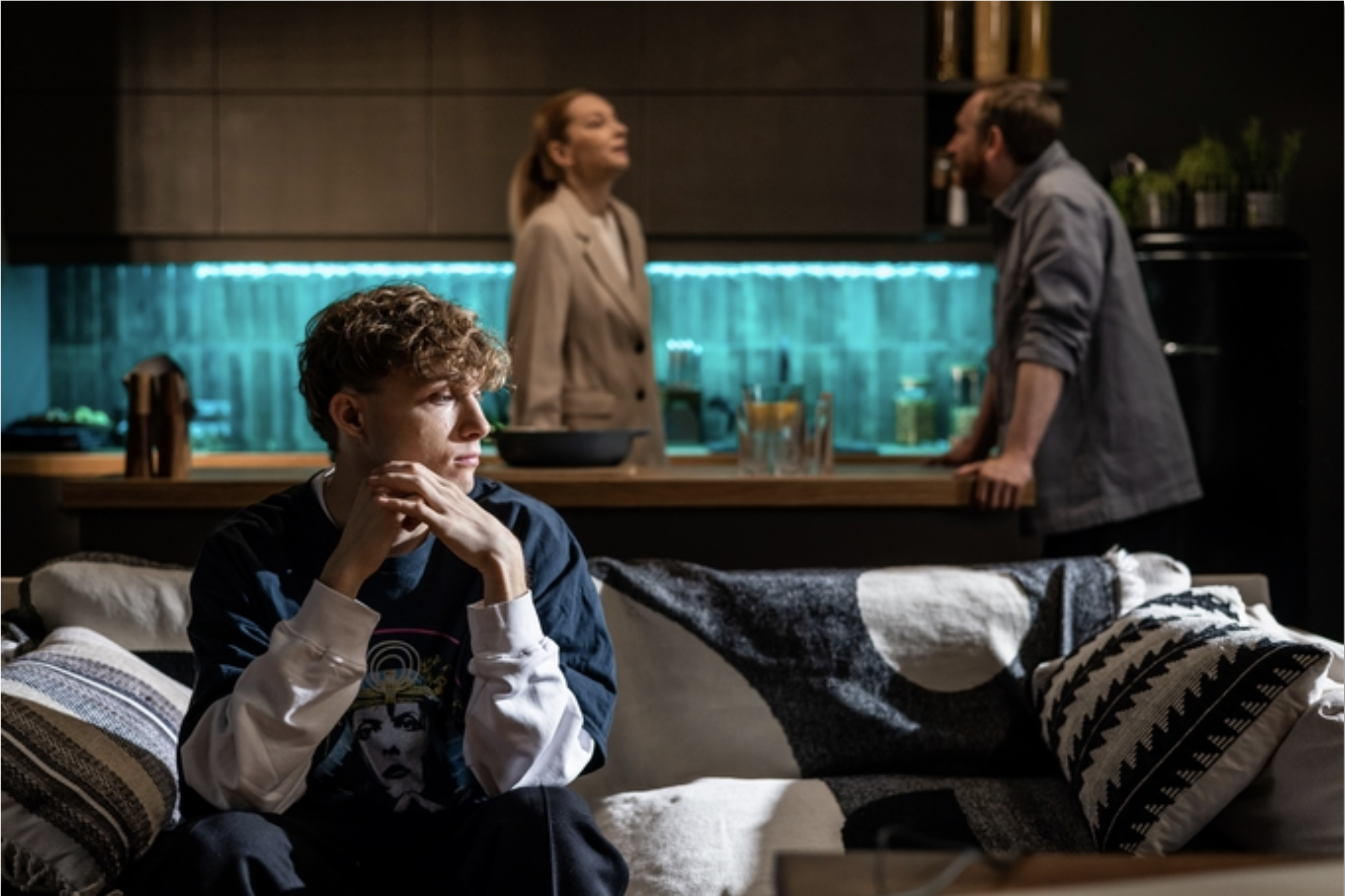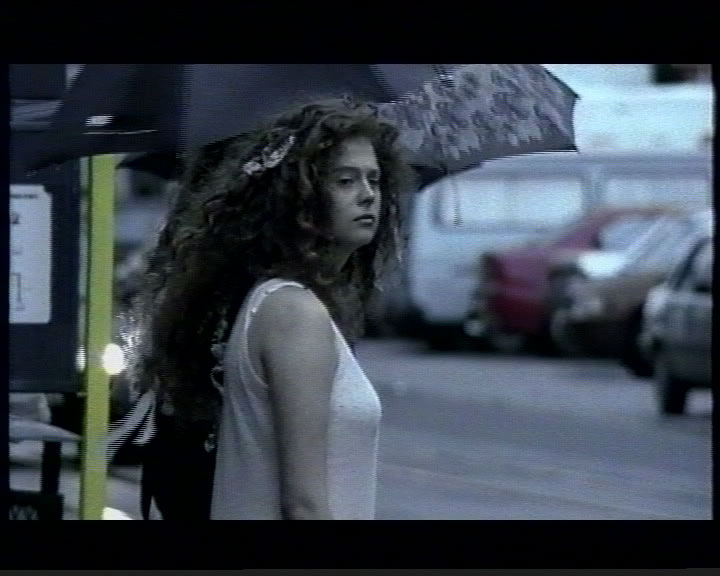SANDWICHMAN
Medium-length film. Directed by Iwona Strzałka. Based on a play by Artur Pałyga.
 Hubert Miłkowski, Agnieszka Przepiórska, Krzysztof Ogłoza. Photo by Tomasz Kacz
Hubert Miłkowski, Agnieszka Przepiórska, Krzysztof Ogłoza. Photo by Tomasz Kacz
Logline:
A tragicomic midlife tale of a man caught between caring for his mother and raising his son, seen through the eyes of the women around him—and guided by a mysterious young woman who becomes his ferryman toward death.
Synopsis:
Sandwichman is a hybrid work between theatre and cinema, adapted from Artur Pałyga’s play and produced within the Teatroteka series. It marks my return to personal filmmaking after years of working in television, and it stands as my first mature artistic statement.
The film follows a man in a midlife crisis, “sandwiched” between the conflicting demands of caring for his ageing mother and raising his adolescent son. Once filled with dreams and aspirations, he now faces the passing of time and the painful recognition that much of what he longed for has been abandoned. His story is told in a tragicomic register, shifting between absurdity and despair.
What makes Sandwichman distinctive is its perspective: the narrative unfolds not only from his viewpoint but through the women who surround him—mothers, lovers, colleagues—each embodying a mirror of his frustrations and failures. Among them, a singular figure stands out: Nikola, a young woman suspended between dream and reality, a representative of a new generation. She becomes a kind of ferryman, accompanying the Sandwichman on his metaphorical passage toward death, blurring the boundary between farewell and transcendence.
Premiered at the “Young and Film” Debuts Festival in Koszalin, Sandwichman is both a personal reckoning and a meditation on time, failure, and the fragile hopes of connection. By combining theatrical stylisation with cinematic intimacy, it confronts the costs of setting aside one’s artistic path and asks what remains when the weight of responsibilities silences youthful aspiration.
The following outstanding actors accepted the invitation to participate in the film: Krzysztof Ogłoza, Dorota Pomykała, Magdalena Popławska, Agnieszka Przepiórska, Karolina Porcari, Wiktoria Gorodeckaja, Daniela Zgadzaj, Hubert Miłkowski, Sebastian Stanki Stankiewicz, Tomasz Sapryk and Mamadou Goo Ba.
Photography by Paweł Flis, set design by Paulina Czernek – Banecka, costume design by Joanna Walisiak-Jankowska, music by Adam Bałdych.
Premiere – June 2025
https://wfdif.pl/pl/produkcja-filmowa/teatroteka/spektakle/sandwichman
https://filmpolski.pl/fp/index.php?film=1265312
https://www.facebook.com/share/1YerhX6fHF/?mibextid=wwXIfr
SIMON PYTHON – AN INNER PORTRAIT
(Polish: SZYMON PYTHON – PORTRET WEWNĘTRZNY).
Written and directed by Iwona Strzałka. Documentary/Drama film

Logline:
A hybrid of documentary and fiction, exploring the inner world of a young filmmaker living with schizophrenia, whose search for expression becomes his way out of solitude.
Synopsis:
Simon Python – An Inner Portrait is a genre-blending film that intertwines confession, documentary realism, and staged narrative. At its heart lies the voice of Szymon, a young aspiring filmmaker affected by schizophrenia, who delivers a raw, personal monologue from off-screen. His testimony, fragile and intimate, becomes the foundation for a fictional story about the longing for expression—an act that opens a door to love and to breaking free from isolation.
The film moves between the stark reality of mental illness and a playful, imaginative world inspired by Monty Python’s Flying Circus, which Szymon embraces as a symbol of freedom and unfettered creativity. Through this oscillation between documentary and stylization, the film captures both the pain of inner confinement and the liberating force of artistic imagination.
Awarded at multiple Polish festivals—including TOFIFEST (Flisak Award), Sopot Film Festival (Special Mention), and others—Simon Python remains a distinctive work in Iwona Strzałka’s filmography: a bold attempt to merge genres in order to give voice to an inner truth too complex for a single form.
Awards: A Special Award for “the originality of film form” at the International Film Festival in Jelenia Góra /together with the film Być NAJ/, A Special Mention at Sopot Film Festival in Sopot, Poland, A Special Mention “for intelligence and professionalism” at the Independent Cinema Festival “STYGMATY”, “The Raftsmam” – A Special Award at International Film Festival TOFIFEST in Toruń /together with the film “Być Naj”/
Participation in festivals: Polish Film Festival, Other Film Festival, Melbourne, 100% ART – The International Festival in Rosh- Hutsot, Israel.
TO BE THE BEST
(Polish: Być Naj)
Written and directed by Iwona Strzałka. Documentary.
Logline:
An intimate documentary about young people confronting stuttering in an experimental therapy where both they and their parents must learn to “speak anew.”
Synopsis:
To Be the Best documents an unconventional therapeutic retreat for young people struggling with stuttering. Each participant arrives not alone, but with a parent—most often a mother or father—who is asked to undergo the same exercises. The premise of the therapy is radical: the process of “learning to speak again” must be shared, so that both child and parent face the vulnerability of broken language together.
The film observes the daily struggles of these teenagers as they confront their fear of speaking, their frustrations, and small victories. At the same time, it reveals the deep emotional bonds between parents and children, bonds tested and reshaped in the unusual setting of therapy. The camera captures not only the moments of breakthrough but also the raw tensions that arise when support is not enough, or when love is strained by impatience and exhaustion.
Through its restrained style and emotional proximity, To Be the Best becomes more than a record of speech therapy: it is a portrait of resilience, of the fragile but powerful ties between parents and children, and of the courage it takes to find one’s own voice.
Awards: a Bronze Dragon at the International Film Festival 2003 in Krakow, Poland, A Special Award for “the originality of film form” at the International Film Festival “Happy End” in Jelenia Góra, /together with the film “Szymon Python”/, “A Raftsman Award” – A Special Award at the International Film Festival TOFIFEST in Toruń/together with the film “Szymon Python”/.
Participation in festivals: Film Festival “Vitae Valor” in Tarnow, Prowincjonalia’03, Poland, Kazimierz’03 Poland
Hug Me, Mum
(Polish: PRZYTUL MNIE MAMO )
Written and directed by Iwona Strzałka. Documentary.
A girl growing up in a family orphanage struggles to win her mother’s affection—just like the adopted children who surround her.
Synopsis:
In a rural family orphanage run by a couple with biological children of their own, the arrival of a new group of adopted kids reshapes the fragile balance of attention and love. Eleven children now compete for the care of a single mother whose time and energy are stretched to the limit.
The film centers on the couple’s biological daughter, who, despite her privileged position, finds herself yearning for closeness as much as the others. She must fight for the mother’s embrace alongside those who have already endured abandonment.
With an intimate lens and documentary realism, Hug Me, Mum portrays childhood desire for security and recognition, showing how love—when divided among many—can still leave everyone hungry.
Participation in the Short Film Festival “DAF” 2001, Human World Festival 2021 Poland
WAITING FOR…
(Polish: CZEKAJĄC NA… )
Written and directed by Iwona Strzałka. Short drama film.
Logline
An aging sex worker begins to see signs she interprets as omens of death—until a chance encounter suggests it might be love instead.
Synopsis
Rooted in magical realism, Waiting for… tells the story of a sixty-year-old sex worker, increasingly isolated and painfully aware of the passage of time. When a wounded bird flies into her apartment—appearing dead before suddenly taking flight—she interprets it as a sign that her own end is near. She purchases a burial plot on a hill beyond the forest, lies down on the earth as if already gone, and begins to prepare herself for death.
On her return home, she misses the bus. A stranger offers her a ride, and together they drive through the night and the rain. He walks her back to her building, its windows all dark, a reminder of her solitude. On the winding stairwell he follows her, and she braces herself for the inevitable. Just before her door, he stops—only to place on her shoulders the scarf she had left behind in his car.
A subtle, atmospheric portrait of mortality and desire, the film blends realism with poetic imagery, suggesting that even on the threshold of death, love may still arrive unbidden.
Participation in numerous Polish and international festivals, including Etiuda’98, Munich Film Festival’99, Hannover’99, Huy’99, Mannheim – Heidelberg’99, Unimovie 2001